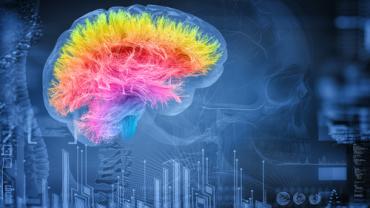
East Asian markets are full of products containing ginseng. There are ginseng teas, hard candies, and more. Some of these products let the word ginseng speak for itself, while others have labels boasting of ginseng’s touted properties for boosting vigor, physical and mental energy, and being a health tonic in general. The ginseng in these products is usually Panax ginseng, but the Panax genus contains many related species that may also confer health benefits. One of these is Panax quinquefolius, a.k.a. American ginseng.
American ginseng has some impressive properties for supporting healthy cognitive function and mental focus. This is welcome news, as the incidence of Alzheimer’s disease and other dementias is already high and projected to rise, owing to the aging of the Baby Boomers and other factors. Diet and lifestyle almost certainly play roles in dementia and cognitive decline. (In fact) But considering that the pharmaceutical drugs developed so far to fight these are virtually ineffective, it is essential to look into other strategies with the potential to boost cognitive function.
Most of the research on American ginseng for this purpose has been done on rats, but there are some useful human studies. We’ll explore the animal research and the biochemical mechanisms at work and then take a look at the data in humans.
The primary active constituents in this plant are called ginsenosides. American ginseng is rich in ginsenoside Rb1 (Rb1), a compound shown to improve spatial learning and memory in hippocampus-dependent tasks. Rb1 was shown in rats to reduce stress-related hippocampal dysfunction, indicated by increased levels of heat shock proteins and brain-derived neurotrophic factor (BDNF). The hippocampus is a key area in the brain for learning, memory and cognition and it’s especially vulnerable to the neurotoxic effects of chronic stress.
Compared to untreated control mice, mice injected with Rb1 showed higher density of synaptophysin, a synaptic marker protein, and had improved spatial learning ability the researchers believed was likely accounted for by an observed increase in synaptic density in the hippocampus. Rb1 has also been shown to facilitate the release of acetylcholine in the hippocampus. Individuals with Alzheimer’s disease typically have reduced acetylcholine levels.
Beyond the potential for isolated ginsenosides to support healthy cognition, studies of American ginseng as a whole show a potential for improved cognitive function through multiple mechanisms. In a mouse model of Alzheimer’s disease, oral administration of American ginseng restored cognitive function impaired by Aβ1-42-induced cytotoxicity. The compound restored brain microtubule-associated protein 2 and synaptophysin, as well as acetylcholine concentration. (It should be noted, though, that many Alzheimer’s experts are beginning to question the validity of the amyloid hypothesis and the role of amyloid plaques in the disease.)
Okay, that was rats. What about humans?
Studies evaluating the effects of American ginseng in humans support its effects on boosting cognitive function in healthy individuals. In a randomized, double-blind, placebo-controlled crossover trial (N=32 healthy adults age 18-40), compared to placebo, improvements in an array of memory and cognition tests as well as mood were demonstrated with American ginseng doses between 100-400mg/day. Similar results were realized in a study evaluating 200mg of American ginseng against placebo in slightly older healthy subjects (N=52, age 40-60): compared to placebo, ginseng improved cognitive performance in working memory at 3 hours.
These studies were done in healthy individuals. Much of the research looking at ginseng in individuals with Alzheimer’s disease (AD) has employed Panax ginseng. This form of ginseng has a different ginsenoside profile from Panax quinquefolius, so the two are not interchangeable. Nevertheless, they are close relatives, so it isn’t unreasonable to look at interventions that used Panax ginseng. For the most part, the evidence isn’t exactly overwhelming. A Cochrane systematic review from 2010 found “a lack of convincing evidence to show a cognitive enhancing effect of Panax ginseng in healthy participants and no high quality evidence about its efficacy in patients with dementia.” A more recent meta-analysis of randomized controlled trials found the effects of ginseng on AD to be inconclusive, and noted that the available studies had small sample sizes and were not well designed.
Individual studies suggest ginseng may have modest benefits for cognition in Alzheimer’s patients. Compared to untreated subjects with AD, subjects who took powdered Panax ginseng (4.5 g/day) for 12 weeks showed small improvements in scores on the mini-mental state examination (MMSE) and Alzheimer disease assessment scale (ADAS). These improvements disappeared after 12 weeks of stopping the supplementation, indicating that the ginseng was indeed having an effect, albeit a small one. Another study of patients with “moderately severe” AD concluded that a heat-processed form of ginseng (which contains more potent ginsenosides than raw ginseng) was effective for improving scores on these two assessments as well.
Improvements were modest, but this isn’t a surprise. Alzheimer’s is a complex, multifactorial illness, and it’s unrealistic to expect one compound to make a huge impact on its own. By itself, ginseng is unlikely to work miracles, but it could be a helpful adjunct to other, more powerful dietary, lifestyle, and pharmaceutical interventions.